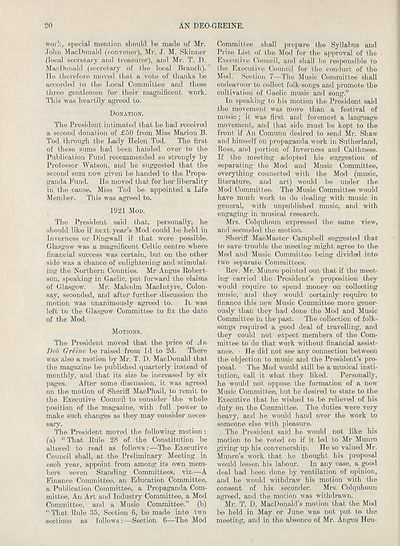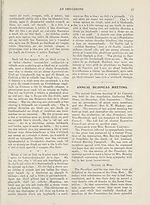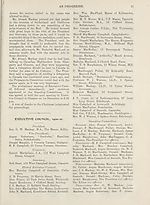An Comunn Gàidhealach Publications > Deo-gréine > Volume 16, October 1920-September 1921
(28) Page 20
Download files
Complete book:
Individual page:
Thumbnail gallery: Grid view | List view

20
AN DEO-GHEINE.
work, special mention should be made of Mr.
John MacDonald (convener), Mr. J. M. Skinner
(local secretary and treasurer), and Mr. T. D.
MacDonald (secretary of the local Branch).
He therefore moved that a vote of thanks be
accorded to the Local Committee and these
three gentlemen for their magnificent work.
This was heartily agreed to.
Donation.
The President intimated that he had received
a second donation of £50 from Miss Marion B.
Tod through the Lady Helen Tod. The first
of these sums had been handed over to the
Publication Fund recommended so strongly by
Professor Watson, and he suggested that the
second sum now given be handed to the Propa¬
ganda Fund. He moved that for her liberality
in the cause, Miss Tod be appointed a Life
Member. This was agreed to.
1921 Mod.
The President said that, personally, he
should like if next year’s Mod could be held in
Inverness or Dingwall if that were possible.
Glasgow was a magnificent Celtic centre where
financial success was certain, but on the other
side was a chance of enlightening and stimulat¬
ing the Northern Counties. Mr Angus Robert¬
son, speaking in Gaelic, put forward the claims
of Glasgow. Mr. Malcolm MacIntyre, Colon-
say, seconded, and after further discussion the
motion was unanimously agreed to. It was
left to the Glasgow Committee to fix the date
of the Mod.
Motions.
The President moved that the price of An
Bed Greine be raised from Id to 2d. There
was also a motion by Mr. T. D. MacDonald that
the magazine be published quarterly instead of
monthly, and that its size be increased by six
pages. After some discussion, it was agreed
on the motion of Sheriff MaoPhail, to remit to
the Executive Council to consider *the whole
position of the magazine, with full power to
make such changes as they may consider neces¬
sary.
The President moved the following motion :
(a) “ That Rule 28 of the Constitution be
altered to read as follows : —The Executive
Council shall, at the Preliminary Meeting in
each year, appoint from among its own mem¬
bers seven Standing Committees, viz.—A
Finance Committee, an Education Committee,
a Publication Committee, a Propaganda Com¬
mittee, An' Art and Industry Committee, a Mod
Committee, and a Music Committee.” (b)
“ That Rule 35, Section 6, be made into two
sections as follows : —Section 6—The Mod
Committee shall prepare the Syllabus and
Prize List of the Mod for the approval of the
Executive Council, and shall be responsible to
the Executive Council for the conduct of the
Mod. Section 7—The Music Committee shall
endeavour to collect folk-songs and promote the
cultivation of Gaelic music and song.”
In speaking to his motion the President said
the movement was more than a festival of
music; it was first and foremost a language
movement, and that side must be kept to the
front if An Comunn desired to send Mr. Shaw
and himself on propaganda work in Sutherland,
Ross, and portion of Inverness and Caithness.
If the meeting adopted his suggestion of
separating the Mod and Music Committee,
everything connected with the Mod (music,
literature, and art) would be under the
Mod Committee. The Music Committee would
have much work to do dealing with music in
general, with unpublished music, and with
engaging in musical research.
Mrs. Colquhoun expressed the same view,
and seconded the motion.
Sheriff MacMaster Campbell suggested that
to save trouble the meeting might agree to the
Mod and Music Committee being divided into
two separate Committees.
Rev. Mr. Munro pointed out that if the meet¬
ing carried the President’s proposition they
would require to spend money on collecting
music, and they would certainly require to
finance this new Music Committee more gener¬
ously than they had done the Mod and Music
Committee in the past. The collection of folk¬
songs required a good deal of travelling, and
they could not expect members of the Com¬
mittee to do that work without financial assist¬
ance. He did not see any connection between
the objection to music and the President’s pro¬
posal. The Mod would still be a musical insti¬
tution, call it what they liked. Personally,
he would not oppose the formation of a new
Music Committee, but he desired to state to the
Executive that he wished to be relieved of his
duty on the Committee. The duties were very
heavy, and he would hand over the work to
someone else with pleasure.
The President said he would not like his
motion to be voted on if it led to Mr Munro
giving up his convenership. He so valued Mr.
Munro’s work that he thought his proposal
would lessen his labour. In any case, a good
deal had been done by ventilation of opinion,
and he would withdraw his motion with the
consent of his seconder. Mrs. Colquhoun
agreed, and the motion was withdrawn.
Mr. T. D. MacDonald’s motion that the Mod
be held in May or June was not put to the
meeting, and in the absence of Mr. Angus Hen-
AN DEO-GHEINE.
work, special mention should be made of Mr.
John MacDonald (convener), Mr. J. M. Skinner
(local secretary and treasurer), and Mr. T. D.
MacDonald (secretary of the local Branch).
He therefore moved that a vote of thanks be
accorded to the Local Committee and these
three gentlemen for their magnificent work.
This was heartily agreed to.
Donation.
The President intimated that he had received
a second donation of £50 from Miss Marion B.
Tod through the Lady Helen Tod. The first
of these sums had been handed over to the
Publication Fund recommended so strongly by
Professor Watson, and he suggested that the
second sum now given be handed to the Propa¬
ganda Fund. He moved that for her liberality
in the cause, Miss Tod be appointed a Life
Member. This was agreed to.
1921 Mod.
The President said that, personally, he
should like if next year’s Mod could be held in
Inverness or Dingwall if that were possible.
Glasgow was a magnificent Celtic centre where
financial success was certain, but on the other
side was a chance of enlightening and stimulat¬
ing the Northern Counties. Mr Angus Robert¬
son, speaking in Gaelic, put forward the claims
of Glasgow. Mr. Malcolm MacIntyre, Colon-
say, seconded, and after further discussion the
motion was unanimously agreed to. It was
left to the Glasgow Committee to fix the date
of the Mod.
Motions.
The President moved that the price of An
Bed Greine be raised from Id to 2d. There
was also a motion by Mr. T. D. MacDonald that
the magazine be published quarterly instead of
monthly, and that its size be increased by six
pages. After some discussion, it was agreed
on the motion of Sheriff MaoPhail, to remit to
the Executive Council to consider *the whole
position of the magazine, with full power to
make such changes as they may consider neces¬
sary.
The President moved the following motion :
(a) “ That Rule 28 of the Constitution be
altered to read as follows : —The Executive
Council shall, at the Preliminary Meeting in
each year, appoint from among its own mem¬
bers seven Standing Committees, viz.—A
Finance Committee, an Education Committee,
a Publication Committee, a Propaganda Com¬
mittee, An' Art and Industry Committee, a Mod
Committee, and a Music Committee.” (b)
“ That Rule 35, Section 6, be made into two
sections as follows : —Section 6—The Mod
Committee shall prepare the Syllabus and
Prize List of the Mod for the approval of the
Executive Council, and shall be responsible to
the Executive Council for the conduct of the
Mod. Section 7—The Music Committee shall
endeavour to collect folk-songs and promote the
cultivation of Gaelic music and song.”
In speaking to his motion the President said
the movement was more than a festival of
music; it was first and foremost a language
movement, and that side must be kept to the
front if An Comunn desired to send Mr. Shaw
and himself on propaganda work in Sutherland,
Ross, and portion of Inverness and Caithness.
If the meeting adopted his suggestion of
separating the Mod and Music Committee,
everything connected with the Mod (music,
literature, and art) would be under the
Mod Committee. The Music Committee would
have much work to do dealing with music in
general, with unpublished music, and with
engaging in musical research.
Mrs. Colquhoun expressed the same view,
and seconded the motion.
Sheriff MacMaster Campbell suggested that
to save trouble the meeting might agree to the
Mod and Music Committee being divided into
two separate Committees.
Rev. Mr. Munro pointed out that if the meet¬
ing carried the President’s proposition they
would require to spend money on collecting
music, and they would certainly require to
finance this new Music Committee more gener¬
ously than they had done the Mod and Music
Committee in the past. The collection of folk¬
songs required a good deal of travelling, and
they could not expect members of the Com¬
mittee to do that work without financial assist¬
ance. He did not see any connection between
the objection to music and the President’s pro¬
posal. The Mod would still be a musical insti¬
tution, call it what they liked. Personally,
he would not oppose the formation of a new
Music Committee, but he desired to state to the
Executive that he wished to be relieved of his
duty on the Committee. The duties were very
heavy, and he would hand over the work to
someone else with pleasure.
The President said he would not like his
motion to be voted on if it led to Mr Munro
giving up his convenership. He so valued Mr.
Munro’s work that he thought his proposal
would lessen his labour. In any case, a good
deal had been done by ventilation of opinion,
and he would withdraw his motion with the
consent of his seconder. Mrs. Colquhoun
agreed, and the motion was withdrawn.
Mr. T. D. MacDonald’s motion that the Mod
be held in May or June was not put to the
meeting, and in the absence of Mr. Angus Hen-
Set display mode to:
![]() Universal Viewer |
Universal Viewer | ![]() Mirador |
Large image | Transcription
Mirador |
Large image | Transcription
| An Comunn Gàidhealach > An Comunn Gàidhealach Publications > Deo-gréine > Volume 16, October 1920-September 1921 > (28) Page 20 |
|---|
| Permanent URL | https://digital.nls.uk/125654323 |
|---|
| Description | Leabhar 16, Mìos Deireannach an Fhogharaidh 1920 gu Darna Mìos an Fhoghair 1921 |
|---|---|
| Attribution and copyright: |
|
| Description | This contains items published by An Comunn, which are not specifically Mòd-related. It includes journals, annual reports and corporate documents, policy statements, educational resources and published plays and literature. It is arranged alphabetically by title. |
|---|
| Description | A collection of over 400 items published by An Comunn Gàidhealach, the organisation which promotes Gaelic language and culture and organises the Royal National Mòd. Dating from 1891 up to the present day, the collection includes journals and newspapers, annual reports, educational materials, national Mòd programmes, published Mòd literature and music. |
|---|---|
| Additional NLS resources: |
|

